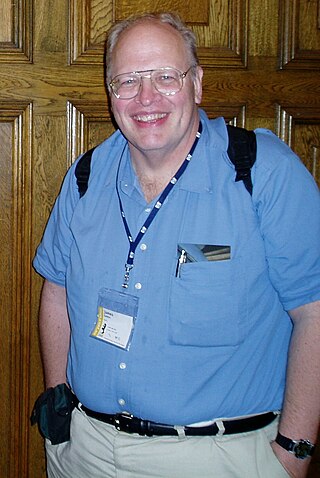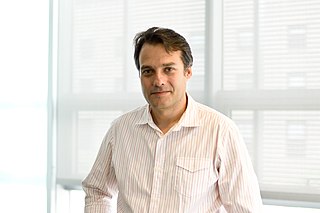
Nicholas Negroponte is a Greek American architect. He is the founder and chairman Emeritus of Massachusetts Institute of Technology's Media Lab, and also founded the One Laptop per Child Association (OLPC). Negroponte is the author of the 1995 bestseller Being Digital translated into more than forty languages.
The Aspen Movie Map was a revolutionary hypermedia system developed at MIT by a team working with Andrew Lippman in 1978 with funding from ARPA.

A computer lab is a space where computer services are provided to a defined community. These are typically public libraries and academic institutions. Generally, users must follow a certain user policy to retain access to the computers. This usually consists of rules such as no illegal activity during use or attempts to circumvent any security or content-control software while using the computers.

The MIT Media Lab is a research laboratory at the Massachusetts Institute of Technology, growing out of MIT's Architecture Machine Group in the School of Architecture. Its research does not restrict to fixed academic disciplines, but draws from technology, media, science, art, and design. As of 2014, Media Lab's research groups include neurobiology, biologically inspired fabrication, socially engaging robots, emotive computing, bionics, and hyperinstruments.
Barry Lloyd Vercoe is a New Zealand-born computer scientist and composer. He is best known as the inventor of Csound, a music synthesis language with wide usage among computer music composers. SAOL, the underlying language for the MPEG-4 Structured Audio standard, is also historically derived from Csound.

Jim Gettys is an American computer programmer. He was involved in multiple computer related projects.

The open-design movement involves the development of physical products, machines and systems through use of publicly shared design information. This includes the making of both free and open-source software (FOSS) as well as open-source hardware. The process is generally facilitated by the Internet and often performed without monetary compensation. The goals and philosophy of the movement are identical to that of the open-source movement, but are implemented for the development of physical products rather than software. Open design is a form of co-creation, where the final product is designed by the users, rather than an external stakeholder such as a private company.

One Laptop per Child (OLPC) was a non-profit initiative established with the goal of transforming education for children around the world; this goal was to be achieved by creating and distributing educational devices for the developing world, and by creating software and content for those devices.

Mitchel Resnick is LEGO Papert Professor of Learning Research, Director of the Okawa Center, and Director of the Lifelong Kindergarten group at the Massachusetts Institute of Technology (MIT) Media Lab. As of 2019, Resnick serves as head of the Media Arts and Sciences academic program, which grants master's degrees and Ph.D.s at the MIT Media Lab.

José Manuel Santana Silvestre, is a Dominican economist, specialist in Technology and Development. He is the Executive Director of the Dominican Republic International Commission of Science & Technology with the rank of ambassador. He is also a Research Affiliate at the Massachusetts Institute of Technology in the Department of Linguistics and Philosophy.

Mary Lou Jepsen is a technical executive and inventor in the fields of display, imaging, and computer hardware. Her contributions have had worldwide adoption in head-mounted display, HDTV, laptop computers, and projector products; she was the technical force behind a generation of low-cost computing, and innovative consumer and medical imaging technologies. She was named one of the hundred most influential people in the world by Time Magazine, was named in 2013 to CNN's top 10 thinkers in science and technology for her work in display innovation, and she has over 200 patents published or issued.
Etoys is a child-friendly computer environment and object-oriented prototype-based programming language for use in education.

Sugar is a free and open-source desktop environment designed for interactive learning by children. Copyright by SugarLabs. Developed as part of the One Laptop per Child (OLPC) project, Sugar was the default interface on OLPC XO-1 laptop computers. The OLPC XO-1.5 and later provided the option of either the Gnome or Sugar interfaces.
The Classmate PC, formerly known as Eduwise, is Intel's entry into the market for low-cost personal computers for children in the developing world. It is in some respects similar to the One Laptop Per Child (OLPC) trade association's Children's Machine (XO), which has a similar target market. Although made for profit, the Classmate PC is considered an Information and Communication Technologies for Development project (ICT4D). Introduced in 2006, the device falls into the then popular category of netbooks.
Bitfrost is the security design specification for the OLPC XO, a low cost laptop intended for children in developing countries and developed by the One Laptop Per Child (OLPC) project. Bitfrost's main architect is Ivan Krstić. The first public specification was made available in February 2007.

The OLPC XO is a low cost laptop computer intended to be distributed to children in developing countries around the world, to provide them with access to knowledge, and opportunities to "explore, experiment and express themselves". The XO was developed by Nicholas Negroponte, a co-founder of MIT's Media Lab, and designed by Yves Behar's Fuseproject company. The laptop is manufactured by Quanta Computer and developed by One Laptop per Child (OLPC), a non-profit 501(c)(3) organization.

The MIT School of Architecture and Planning is one of the five schools of the Massachusetts Institute of Technology, located in Cambridge, Massachusetts. Founded in 1865 by William Robert Ware, the school offered the first formal architectural curriculum in the United States, and the first architecture program in the world operating within the establishment of a university. MIT SAP is considered a global academic leader in the design field and one of the most accomplished schools in the world. MIT's department of architecture has consistently ranked among the top architecture/built environment schools in the world, and from 2015 to 2018 was ranked highest in the world in QS World University Rankings. In 2019, it was ranked second to The Bartlett but regained the number one position later on in the 2020 rankings.
Sugar Labs is a community-run software project whose mission is to produce, distribute, and support the use of Sugar, an open source desktop environment and learning platform. Sugar Labs was initially established as a member project of the Software Freedom Conservancy, an umbrella organization for free software (FLOSS) projects., but in 2021, it became an independent 501(c)(3) organization.

Michail Bletsas is a Greek research scientist and the Director of Computing at the MIT Media Lab.













